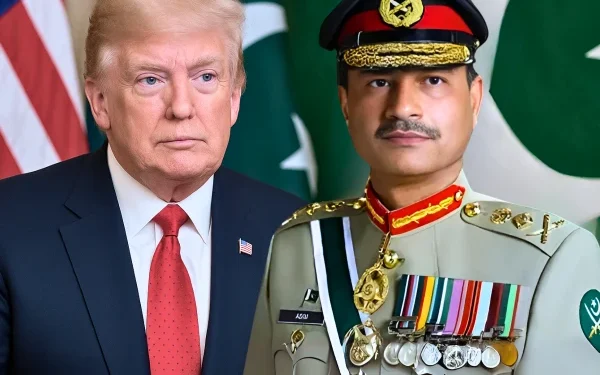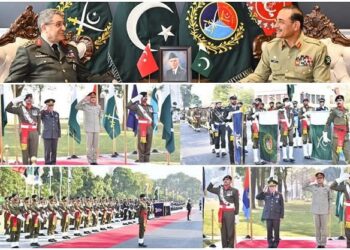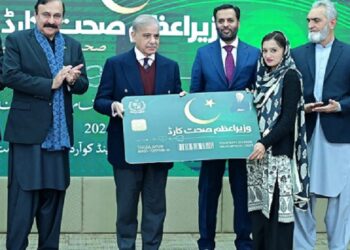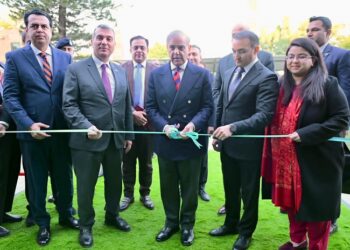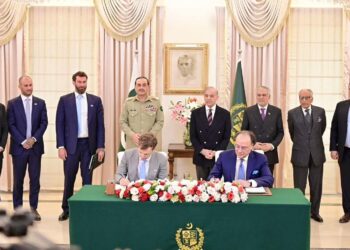High-Level Diplomacy Marks a New Chapter in Pak-US Bilateral Relations
Washington, D.C. — In a significant diplomatic gesture reflecting warming relations between Pakistan and the United States, US President Donald Trump is set to host a formal luncheon today at the White House in honor of Field Marshal General Asim Munir, Pakistan’s Chief of Army Staff. This high-profile event, scheduled for 1 PM in the White House Cabinet Room, marks a pivotal moment in the evolving geopolitical dynamics of South Asia and the broader global defense landscape.
According to official sources, this meeting symbolizes a fresh chapter of military and diplomatic cooperation between Islamabad and Washington, driven by mutual strategic interests in regional security, counter-terrorism, and defense modernization.
Purpose of the Visit: Strengthening Bilateral Military and Strategic Ties
The luncheon is more than a ceremonial gathering; it is expected to serve as a key platform for strategic dialogue on a wide range of bilateral issues. As stated in the official press release, the primary focus of the discussions will be:
- Enhancing defense cooperation between Pakistan and the United States.
- Reviewing the regional security situation, particularly in Afghanistan and the Indo-Pacific.
- Discussing ongoing counter-terrorism initiatives and intelligence-sharing mechanisms.
- Exploring opportunities for joint military training and defense technology exchange.
The visit underscores Pakistan’s central role in maintaining regional stability and countering extremism, while also positioning the US as a reliable partner in addressing shared global security threats.
Field Marshal Asim Munir’s Strategic Engagements in Washington
Apart from the White House luncheon, Field Marshal Asim Munir has a packed itinerary during his US visit. According to diplomatic sources, he is scheduled to hold separate bilateral meetings with:
- US Secretary of State Antony Blinken, to discuss foreign policy alignment, regional diplomacy, and economic cooperation.
- US Secretary of Defense Lloyd Austin, where military-to-military cooperation, arms agreements, and defense modernization will be on the agenda.
- Senior members of the US National Security Council to exchange views on emerging threats, cybersecurity, and border security management.
These engagements are expected to result in new agreements and a framework for future collaboration between the armed forces and intelligence communities of both countries.
Historical Context: Evolution of Pak-US Relations
The Pakistan–United States relationship has historically oscillated between periods of strategic alignment and mutual skepticism. The two countries were close allies during the Cold War, particularly during the Afghan-Soviet war in the 1980s. However, relations cooled after the US invasion of Afghanistan in 2001, with Washington often accusing Islamabad of harboring extremist groups, while Pakistan criticized US drone operations on its soil.
Over the past decade, especially following the US withdrawal from Afghanistan in 2021, both nations have made efforts to recalibrate their relationship, moving from a transactional approach to a strategic one. Field Marshal Asim Munir’s visit signifies a continued effort to rebuild trust, establish long-term defense cooperation, and pursue a shared vision of regional peace.
Key Issues Expected to Be Discussed
1. Afghanistan and Regional Stability
With the Taliban’s return to power in Afghanistan, the security dynamics of South Asia have undergone a seismic shift. Both Pakistan and the United States have stakes in ensuring that Afghan territory is not used as a base for international terrorism. The meeting will likely explore ways to engage constructively with the Afghan leadership, prevent extremist resurgence, and ensure humanitarian support for the Afghan people.
2. Counter-Terrorism and Intelligence Sharing
Pakistan has remained a key player in combating terrorist organizations like ISIS-K, Tehrik-i-Taliban Pakistan (TTP), and Al-Qaeda. The US is expected to offer enhanced support in the form of intelligence sharing, technical training, and possibly counter-terrorism equipment to bolster Pakistan’s capability in neutralizing these threats.
3. China’s Growing Influence
China’s expanding influence in Pakistan through the China-Pakistan Economic Corridor (CPEC) is a matter of strategic interest to Washington. While Pakistan continues to maintain close economic ties with Beijing, the US is keen on ensuring that this partnership does not evolve into military dependency. Discussions may focus on offering alternatives through US investment, economic aid, and technology partnerships.
4. Defense Modernization and Military Training
Pakistan has expressed interest in modernizing its armed forces, and the US has the potential to play a crucial role in this transformation. Discussions may lead to agreements on joint military exercises, weapons procurement, and cyber-defense training, thereby enhancing interoperability between the two forces.
Symbolism and Geopolitical Impact of the Luncheon
The decision by President Trump to host the Pakistani military chief in such a formal setting underscores the symbolic importance of military diplomacy in the US foreign policy toolkit. It sends a message not only to Islamabad but also to other key regional players—notably India, China, and Iran—that Pakistan remains a valued strategic partner for the United States.
For Pakistan, the event reinforces Field Marshal Asim Munir’s stature as a key figure in regional diplomacy, especially at a time when the military continues to play a central role in Pakistan’s foreign policy decision-making.
Expert Opinions on the Significance of the Visit
Defense analysts and diplomatic experts view this visit as a turning point in bilateral relations. Dr. Huma Baqai, an international relations professor based in Karachi, noted:
“This visit comes at a critical time for Pakistan, which is trying to diversify its alliances and reassert its role as a stabilizing power in South Asia. The US needs Pakistan’s help on multiple fronts—from counter-terrorism to China containment—and this engagement offers a practical way forward.”
Similarly, retired Brigadier Farooq Hameed, a defense analyst, emphasized:
“Field Marshal Asim Munir’s ability to engage top US leadership shows that Pakistan is being taken seriously once again in international corridors of power. This visit can pave the way for future military and intelligence collaboration.”
Potential Outcomes and Future Trajectory
While no formal agreements have yet been announced, the outcomes of this high-level visit could shape the future trajectory of US-Pakistan relations in the following ways:
- Initiating new defense pacts or joint task forces.
- Enhanced military aid packages and capacity-building programs.
- Greater involvement of Pakistan in regional peacekeeping missions.
- Expansion of people-to-people ties through academic and military exchanges.
Most importantly, it signals a strategic reset in relations—moving from past mistrust to a future built on mutual respect and shared interests.
Conclusion: A New Era in Pak-US Relations?
Field Marshal Asim Munir’s luncheon with President Donald Trump represents more than diplomatic protocol—it’s a signal to the world that Pakistan and the United States are actively rebuilding their strategic alliance. With shared interests in security, stability, and regional influence, this meeting could mark the beginning of a new era in bilateral relations.
As both nations navigate a complex global landscape marked by great power rivalries, regional conflicts, and emerging threats, continued engagement, trust-building, and strategic dialogue will be key to sustaining this momentum.
















